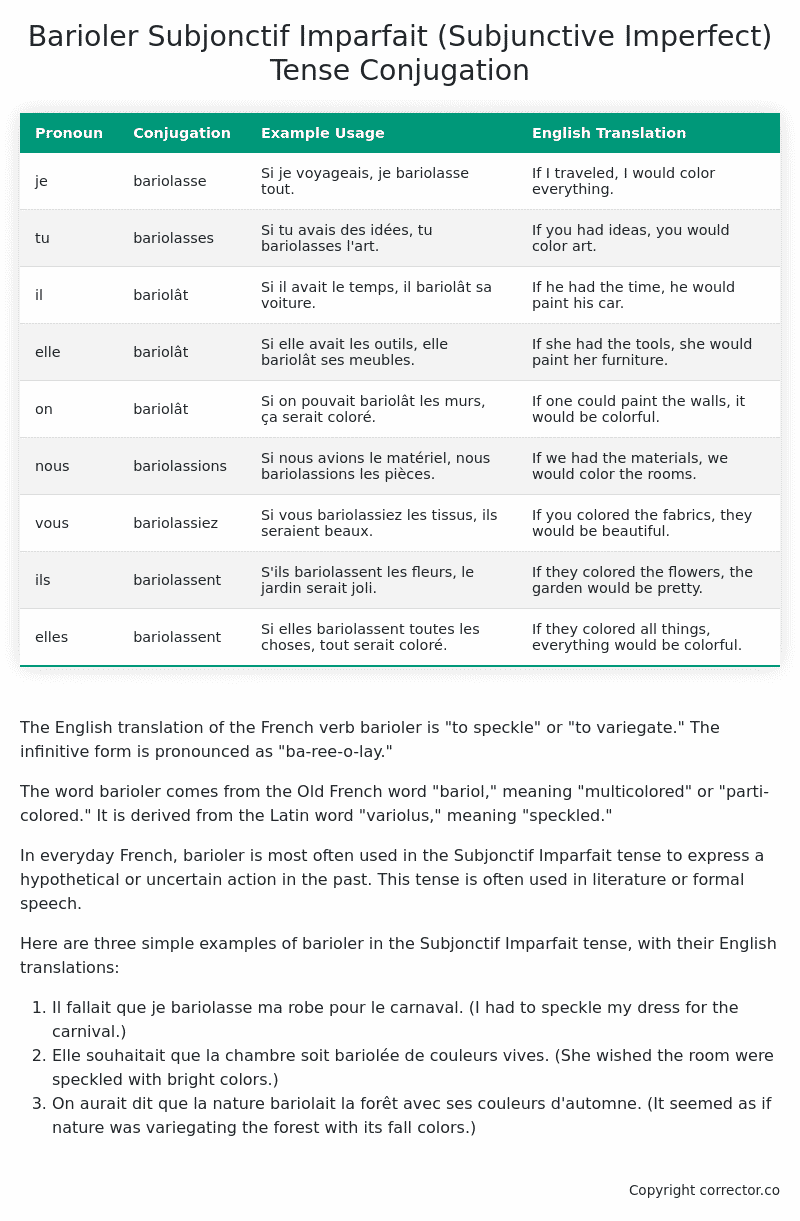Subjonctif Imparfait (Subjunctive Imperfect) Tense Conjugation of the French Verb barioler
Introduction to the verb barioler
The English translation of the French verb barioler is “to speckle” or “to variegate.” The infinitive form is pronounced as “ba-ree-o-lay.”
The word barioler comes from the Old French word “bariol,” meaning “multicolored” or “parti-colored.” It is derived from the Latin word “variolus,” meaning “speckled.”
In everyday French, barioler is most often used in the Subjonctif Imparfait tense to express a hypothetical or uncertain action in the past. This tense is often used in literature or formal speech.
Here are three simple examples of barioler in the Subjonctif Imparfait tense, with their English translations:
- Il fallait que je bariolasse ma robe pour le carnaval. (I had to speckle my dress for the carnival.)
- Elle souhaitait que la chambre soit bariolée de couleurs vives. (She wished the room were speckled with bright colors.)
- On aurait dit que la nature bariolait la forêt avec ses couleurs d’automne. (It seemed as if nature was variegating the forest with its fall colors.)
Table of the Subjonctif Imparfait (Subjunctive Imperfect) Tense Conjugation of barioler
| Pronoun | Conjugation | Example Usage | English Translation |
|---|---|---|---|
| je | bariolasse | Si je voyageais, je bariolasse tout. | If I traveled, I would color everything. |
| tu | bariolasses | Si tu avais des idées, tu bariolasses l’art. | If you had ideas, you would color art. |
| il | bariolât | Si il avait le temps, il bariolât sa voiture. | If he had the time, he would paint his car. |
| elle | bariolât | Si elle avait les outils, elle bariolât ses meubles. | If she had the tools, she would paint her furniture. |
| on | bariolât | Si on pouvait bariolât les murs, ça serait coloré. | If one could paint the walls, it would be colorful. |
| nous | bariolassions | Si nous avions le matériel, nous bariolassions les pièces. | If we had the materials, we would color the rooms. |
| vous | bariolassiez | Si vous bariolassiez les tissus, ils seraient beaux. | If you colored the fabrics, they would be beautiful. |
| ils | bariolassent | S’ils bariolassent les fleurs, le jardin serait joli. | If they colored the flowers, the garden would be pretty. |
| elles | bariolassent | Si elles bariolassent toutes les choses, tout serait coloré. | If they colored all things, everything would be colorful. |
Other Conjugations for Barioler.
Le Present (Present Tense) Conjugation of the French Verb barioler
Imparfait (Imperfect) Tense Conjugation of the French Verb barioler
Passé Simple (Simple Past) Tense Conjugation of the French Verb barioler
Passé Composé (Present Perfect) Tense Conjugation of the French Verb barioler
Futur Simple (Simple Future) Tense Conjugation of the French Verb barioler
Futur Proche (Near Future) Tense Conjugation of the French Verb barioler
Plus-que-parfait (Pluperfect) Tense Conjugation of the French Verb barioler
Passé Antérieur (Past Anterior) Tense Conjugation of the French Verb barioler
Futur Antérieur (Future Anterior) Tense Conjugation of the French Verb barioler
Subjonctif Présent (Subjunctive Present) Tense Conjugation of the French Verb barioler
Subjonctif Passé (Subjunctive Past) Tense Conjugation of the French Verb barioler
Subjonctif Imparfait (Subjunctive Imperfect) Tense Conjugation of the French Verb barioler (this article)
Subjonctif Plus-que-parfait (Subjunctive Pluperfect) Tense Conjugation of the French Verb barioler
Conditionnel Présent (Conditional Present) Tense Conjugation of the French Verb barioler
Conditionnel Passé (Conditional Past) Tense Conjugation of the French Verb barioler
L’impératif Présent (Imperative Present) Tense Conjugation of the French Verb barioler
L’infinitif Présent (Infinitive Present) Tense Conjugation of the French Verb barioler
Struggling with French verbs or the language in general? Why not use our free French Grammar Checker – no registration required!
Get a FREE Download Study Sheet of this Conjugation 🔥
Simply right click the image below, click “save image” and get your free reference for the barioler Subjonctif Imparfait tense conjugation!

Barioler – About the French Subjonctif Imparfait (Subjunctive Imperfect) Tense
Formation
Common Everyday Usage Patterns
Interactions with Other Tenses
Subjonctif Présent
Indicatif Passé Composé
Conditional
Conditional Perfect
Summary
I hope you enjoyed this article on the verb barioler. Still in a learning mood? Check out another TOTALLY random French verb conjugation!


